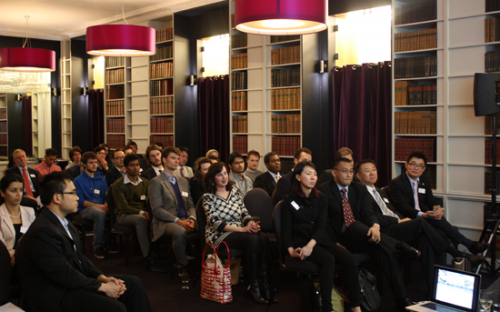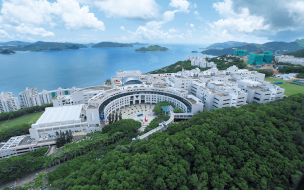“Asia is no longer the next big thing,” he said at a BusinessBecause event in central London. “It is happening now. As far as economic outlook is concerned, everything points to Asia.”
For one cold Tuesday evening in December, Asia came to London. Four of the region’s top business schools – China Europe International Business School, Nanyang Business School, the Indian School of Business and Hong Kong University of Science and Technology – attended an event in the UK to promote the benefits of studying and launching a career in Asia.
Many of the world’s top business schools are in the region and international students are flocking to Asian MBA programs in higher numbers than ever before.
Global MBA Rankings show that five b-schools in China, including CEIBS, are ranked in the top-100 worldwide, while Nanyang is ranked in the top-50.
Deciding where to study is an important decision, but deciding where to begin a career is even more so. More often than not, they are the same – and according to these top business schools, opportunities in Asia can give your career a competitive advantage.
Nick says an MBA from Asia will distinguish you from other graduates. “You will have a better understanding of the culture of business in Asia,” he said form the Royal Institution in Mayfair. “If you want a career in Asia, you will have an advantage.
“Whether it’s in Shanghai, Hyderabad, Hong Kong or Singapore; these are the best four locations if you want to start a career in Asia.”
Nanyang, a business school ranked #32 in the Financial Times’ MBA Rankings, is based in Singapore and the MBA program has a strong Asian focus. “Singapore is ideal; it’s just six hours to Shanghai, Hyderabad and Australia,” Nick said. “Our program is based on Asia and we have a strong reputation in China.”
While Nanyang is an excellent school to attend if you are thinking of a finance-related career, they seek career diversity too. “We are looking for diversity; you can be from a range of backgrounds,” continued Nick. “We have a strong focus on leadership and that is one of the recent curriculum changes.”
Shimin Chen, MBA Program Director at CEIBS, says that an MBA in Shanghai will set you apart in all regions of the world. “About forty per cent of our cohort is from outside China, representing around thirty countries,” he said.
“We have three different locations across China and have exchange opportunities with London Business School in the UK. We have an international curriculum and our motto is: China depth, global breadth.”
CEIBS is one of the top-twenty MBA programs globally, and Shimin says students can use CEIBS to both kick-start careers and switch industries. The curriculum is comparable to any business school in the world, he says, and networking opportunities are second to none.
“We have many networking opportunities, and our students are highly sought after in China,” he said. “We have alumni working for multi-national companies, helping to manage relationships with China.
“If you believe China is important for the future world, your experiences with us will pay off handsomely in the long run.”
HKUST may be based in Hong Kong, but it is their multi-national faculty that sets them apart from other business schools. According to Pauline Cheung, Manager of Marketing & Admissions, MBA Programs, international students thrive at the b-school.
“It’s an international community and many find it easy to adapt to Hong Kong,” she said. “We have got a good reputation and our faculty has been ranked as Asia’s number-one. Lots of our faculty have PhD qualifications, but many of them have also held key positions in multinational firms.”
HKUST has a strong focus on China and international students will have a good opportunity to launch a career in the country after graduation. Ranked #8 by the FT’s 2013 full-time MBA Rankings, HKST has around 100 students with over 30 different nationalities.
Hong Kong may be a centre of excellent for finance, but HKUST is big on entrepreneurship. “It’s a good place for people that want to start-up businesses,” Pauline added. “There is a low tax-rate and the city is flexible.
“We have an entrepreneurship centre, which runs a competition every year that MBA students can join. You will get the chance to receive different (entrepreneurial) training, and learn how to produce a business plan - which some students have run successfully in Asia after graduating.”
The economies of China may be booming, but India is one of the strongest emerging markets. Studying at the Indian School of Business will give you many career opportunities, according to an MBA alumnus representing ISB at the event. “The growth of India and China has been backed by many different sectors,” he said.
“In India, services are strong. It is a country that has got huge potential in terms of capital markets. The population is young and you will have a huge pool of customers ready to buy services from your businesses.”
The one-year program at ISB, ranked #34 in the FT’s global MBA Rankings, offers the same depth of study as a two-year program, but it is condensed. You won’t be out of the job market for long and ISB MBAs have some of the best career opportunities in Asia.
“Around four-hundred companies recruit from our campuses,” he said. “The top-five companies from all sectors come to our campus to recruit. It gives you a huge opportunity for work placements.
“Having us on your CV is going to be really valuable. The average salary that an MBA graduate is offered is about $130,000. We have great networking opportunities and we have the best of both worlds: we have affiliations with LBS, Wharton, Kellogg and MIT.”
RECAPTHA :
bf
be
01
f7








